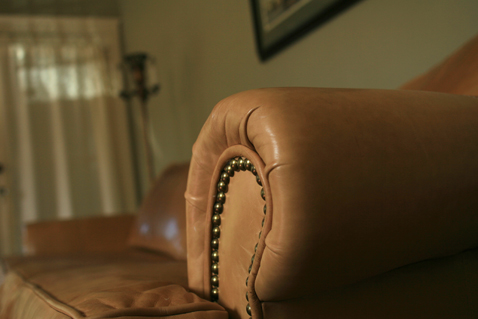I drive to work about the same time every day. Most of the time the soundtrack for that is news. I drive home at all different times, depending on how many students came by that day, what else I have on my plate, where else I have to be, and how soon. And so the soundtrack for the drive home is a mish-mash. Some days, it's mp3s of the stuff I downloaded over the weekend, some days-- CDs. But some days, depending on what I stumble upon when the car comes back to life, it's radio again.
And this is how sometime last week I was introduced to Philip Galanes, who, as I found out that day, writes the advice column Social Qs for the Sunday edition of NYTimes, and now has a book out by the same name. I started driving part way through his conversation with the Fresh Air host Terry Gross, and stayed on the channel. There was something very human and kind about Mr. Galanes, and it made me think that the program wouldn't be a bad thing to listen to all the way home.
They spent some time on peculiarities of the modern, technology-enabled world, touched upon dinner party etiquette, but by the time I was flying down the highway, the conversation turned very personal. First, about Mr. Galanes's childhood as a family "fixer," and then, tragically, to the death of Mr. Galanes's father, by his own hand. Deep, personal pain. Feeling responsible, as many suicide survivors do, but in his case because he was, you know, the family fixer. And, for years, not something he could talk about honestly. Eventually, he could.
So what do you think happens when someone answers a question about, say what his parents do by saying actually, my father committed suicide when I was 23?
"One of the shocking things about suicide too is that people feel very entitled to start asking really wildly inappropriate questions. Like the first thing generally people will say to you after you say that your father killed himself, is that they'll go oh, how did he do it? They might say oh, I'm sorry or oh, that must be terrible for you. Then they'll go how, how did he do it? And I don't know if that's some macabre thing coming up or what it is."
I wish I could say I was shocked. But I am not. Not even a little. The thing is, I learned, people feel very entitled to start asking really wildly inappropriate questions and to start dispensing really wildly inappropriate advice in all sorts of situations. Like, to take a completely random example, when you answer a question about children in a way that does not leave out your dead one(s).
What I did find a little surprising, what I am still mulling over, and why I am writing this now, is Mr. Galanes's response to the follow up question on what makes for an appropriate answer to a wildly inappropriate question like this. Because his response, and, perhaps more importantly, the spirit of his response, is much-much kinder than I am inclined to be to the wildly inappropriate. His response is meant not just for suicide survivors, but also for those encountering other kinds of drive-bys. A common ones, in his own description, are the various incarnations of the fertility-presuming questions aimed at quietly and desperately infertile. But there are also the ones aimed at conspicuously single, and, I imagine, many other kinds of vulnerable.
So in his own words: "I think the best response that I have been able to come up with is "Why do you ask?" Because it delivers the question back to someone in a way that lets them see it, hopefully, for how inappropriate and - I don't want to judge the people. [...] Most people are just thoughtless. They didn't mean to hurt your feelings. So by saying why do you ask, you give them an opportunity to really consider, wow, that really was pretty inappropriate."
And later: "But no, but you're quite right. There are lots of ways. It's also entirely appropriate to say gosh, I'd rather not discuss that. But I find the less that my response is like a slap across their face, the more I feel the possibility is for the two of us to go on and have a nice conversation that isn't going to be about how my dad killed himself or why."
And I think it is this presumptive kindness that really gets me. Because I certainly see what he is saying, but I can't say that I am fully on board. Or maybe I am not fully on board in case of the kind of loss common to us here. Because here's how I look at this. The person doing the asking, the wildly inappropriate one, is not the one who needs kindness. Or not the one who needs it more. The person whose heart is, again, ripped open by the question, that's the person in need of tenderness and kindness.
What I think Mr. Galanes is doing by committing to this kind of a soft and gentle mirror-holding, is accepting onto himself the extra responsibility for the feelings of the offender. I find the kindness of such an impulse commendable, but more than that, I find the imposition of it unfair. That is, I rebel against accepting his advice as the norm for myself or anyone else. The fine line I am willing to walk here is that I am ok with any individual who voluntarily decides to go that way, but I am firmly against deciding as a society that this should be the norm of behavior for the offended party in the conversation. Because see, this imposition of self-restraint then normalizes the wildly inappropriate, makes it an ok thing to ask, and assumes that the burden of not letting the conversation escalate rests on the already vulnerable.
I've said from almost the very beginning that I do not so much mind the random questions as I mind the clueless and hurtful reactions to my answers. It is the truth of our society that people ask personal questions, some of them shrouded in wording that implies judgement about your choices, and some of them worded entirely neutrally. So people ask. But I find it cowardly and unacceptable to only be prepared for the shiny happy answers. Mr. Galanes says that people blurt out stupid stuff because they are unprepared, because you in your answer have "just laid something unexpected down." It may be unexpected, but it is not outside the range of human experience. And that is what upsets me about the wildly inappropriate-- they are ready to carry on a long and fluffy conversation when your responses fit their expected pattern, but God forbid you should bring in a real painful truth and you can almost hear the circuits in their brains frying, resistors popping like popcorn.
Angry? Who, me? Actually, I prefer to think of it as indignant. I think the difference is that Mr. Golanes wants to fix things, and I want things to be fair. Not, you know, in the cosmic sense-- I know that's impossible, as attested to by the very need for this site to exist, by the abundance of the RE offices, and by the suicide survivor networks, just to name a few,-- but in an everyday sense. In the sense where the courtesy Mr. Golanes wants to show the wildly inappropriate, the courtesy he feels obligated to show them, I want them to feel obligated to show it to us. If the courtesy is to be common, I want it to be well and truly common.
To give Mr. Galanes his very deserved due, he doesn't call for the vulnerable to always show the soft spot. He himself lied for years about how his father died, trying on this illness and that. He appreciates that the vulnerable's need for safety, as his was during those years, and as the woman in the midst of a serious cancer relapse whom he very recently provided with a dispensation to lie until she's ready, that this need is more important that the other's need or want to know. But maybe there are some soft spots that burn more painfully when hidden. After all, when Mr. Galanes lied about how his father died nobody around was presuming that he didn't have a father or that he didn't love his father. In contrast, a desperately infertile woman, years into treatment, might want to expose her needle-poked flesh to wipe that smug smile off the face of the presumptuous fool who is going on about how she must enjoy the opportunity she has to sleep in on weekends. And a bereaved parent might, just might, want to point out that the hardest decision a parent has to make is really not the one about whether to spend the money on that expensive toy your kid really wants. I am just saying.
The thing is, I have, on occasion, myself used the relatively gentle "why do you ask?" And at other times, I have been far less kind. As I say above, it is the mandate of always picking choice (a) that I shirk. And maybe, as Mr. Golanes suggests, the difference is in whether I want to have the conversation continue peacefully or whether I want to explode the biggest bomb in the middle of the room. I don't like scenes. I do not enjoy scenes. And for certain I do not want to use my son as a weapon. But there are ways to be quietly dignified and yet to deliver a memorable punch. I reserve those mostly for repeat offenders, but I have delivered those too. The way I see it, the wildly inappropriate has already hurt me. How I react to it will not make the hurt less. But maybe, if I am memorable, it will make it less likely that the person will go on in the same vein. Maybe, just maybe, I will help spare another bereaved parent down the road the tender mercies of this particular wildly inappropriate person. Maybe.
So what are you-- a fixer, a justice-seeker, something entirely different? And where do you come down on this? How should we respond? How have you responded?




